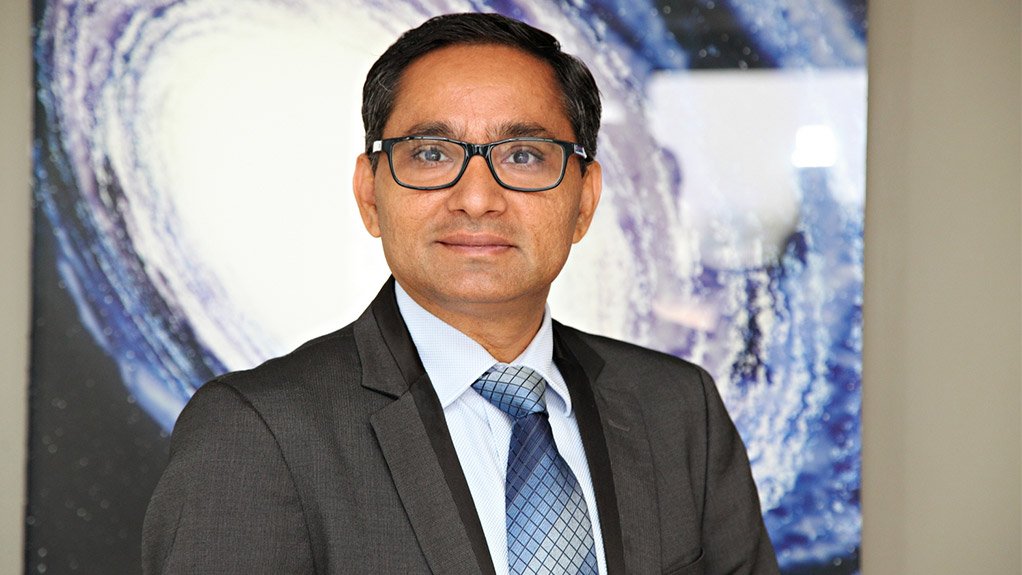New technology can optimise project management


MAHENDRA DEDASANIYA The capital projects industry has historically underinvested in technology and it has been resistant to change
To ensure that capital projects are delivered on time, project management teams need to be proactive in using the latest tools and technology, says global advisory firm Deloitte Africa director consulting and Africa infrastructure and capital projects leader Mahendra Dedasaniya.
“The capital projects industry has historically underinvested in technology and it has been resistant to change, hence there being an opportunity to use technology to improve capital efficiency, leverage project delivery . . . reduce the total investment cost . . . and subsequent operational savings.”
Advancements in finance platforms, Internet-based sensor technology, unmanned vehicles, cloud-based solutions and analytics capabilities are converging to provide a paradigm shift for capital projects, creating real opportunities on which industry players can capitalise, he mentions.
Dedasaniya explains that, with the advent of new technologies, project managers can use digital project control platforms to analyse and integrate the information from the broader ecosystem such as the regulatory environment, policies, business context, project benefits realisation procedures, project finance and organisational maturity.
“This could also help to shape team development, providing new thoughts on the team formation process and the different skills sets needed from team members to handle future complex projects.”
Dedasaniya adds that Big Data analytics can be used to analyse risks and security-related data to develop new techniques and procedures for creating risk- response strategies that can assist in finding solutions for problems or develop new best practices.
He explains that the analysis of Big Data sources also helps to identify key drivers for the improved safety and delivery efficiency of capital projects.
“The capital project industry has not changed significantly in the past 50 years and it appears to be burdened by legacy processes and inefficiencies, making it conducive to a technological upheaval,” notes Dedasaniya.
Moreover, leveraging technology in the planning, delivery and operation of capital projects presents a potentially significant business value opportunity.
Dedasaniya identifies drones, blockchains, advanced analytics and artificial intelligence, building information modelling and autonomous systems, as well as the Internet of Things (IoT), as new technologies that should be considered in the development of capital projects.
“Drones are proving useful for various applications, such as the collection of construction data through aerial images and three-dimensional (3D) models, the tracking of the progress of projects and the weather, as well as health and safety assessment prior to workforce mobilisation.”
He mentions that blockchains enable parties to trust a shared record or ledger – they can streamline business processes and establish transparency, trust and accountability, allowing for value to be tracked and transferred without third-party mediation.
Dedasaniya says construction analytics delivers capabilities to anticipate and proactively manage project issues and risks using data to deliver insights about project performance and support data-driven decision-making.
Moreover, building information modelling delivers 3D model- ling of construction projects prior to physical construction to enhance design, constructability and operational readiness reviews.
Concerning IoT, Dedasaniya says the internetworking of physical devices with computer- based technologies, such as intelligent transportation and wearable technology, is pioneering a way of collecting, exchanging and using data to improve decision-making.
Integration Management Office
Dedasaniya explains that the capital projects supply chain has traditionally been based on misaligned commercial objectives and incentives, with owners apparently more interested in meeting performance and schedule, while the contractors are interested in increasing contract price and thereby profit.
Therefore, he notes that an integration management office (IMO) system should be used for capital projects, as it functions as the owner’s integration management team and manages the interface and interdependencies among the various agencies to ensure that the project objectives are achieved.
He notes that IMO provides a ‘flat’ management structure – one which removes the layer of hierarchical management – which also helps to escalate communication and promote innovation and collaboration.
“The benefit of IMO is that it manages the integration of a cluster of prime contracting entities focused on controlling project cost, schedule delivery and performance while de-risking the project, owing to increased project coordination and effective interface management.”
Article Enquiry
Email Article
Save Article
Feedback
To advertise email advertising@creamermedia.co.za or click here
Press Office
Announcements
What's On
Subscribe to improve your user experience...
Option 1 (equivalent of R125 a month):
Receive a weekly copy of Creamer Media's Engineering News & Mining Weekly magazine
(print copy for those in South Africa and e-magazine for those outside of South Africa)
Receive daily email newsletters
Access to full search results
Access archive of magazine back copies
Access to Projects in Progress
Access to ONE Research Report of your choice in PDF format
Option 2 (equivalent of R375 a month):
All benefits from Option 1
PLUS
Access to Creamer Media's Research Channel Africa for ALL Research Reports, in PDF format, on various industrial and mining sectors
including Electricity; Water; Energy Transition; Hydrogen; Roads, Rail and Ports; Coal; Gold; Platinum; Battery Metals; etc.
Already a subscriber?
Forgotten your password?
Receive weekly copy of Creamer Media's Engineering News & Mining Weekly magazine (print copy for those in South Africa and e-magazine for those outside of South Africa)
➕
Recieve daily email newsletters
➕
Access to full search results
➕
Access archive of magazine back copies
➕
Access to Projects in Progress
➕
Access to ONE Research Report of your choice in PDF format
RESEARCH CHANNEL AFRICA
R4500 (equivalent of R375 a month)
SUBSCRIBEAll benefits from Option 1
➕
Access to Creamer Media's Research Channel Africa for ALL Research Reports on various industrial and mining sectors, in PDF format, including on:
Electricity
➕
Water
➕
Energy Transition
➕
Hydrogen
➕
Roads, Rail and Ports
➕
Coal
➕
Gold
➕
Platinum
➕
Battery Metals
➕
etc.
Receive all benefits from Option 1 or Option 2 delivered to numerous people at your company
➕
Multiple User names and Passwords for simultaneous log-ins
➕
Intranet integration access to all in your organisation


















